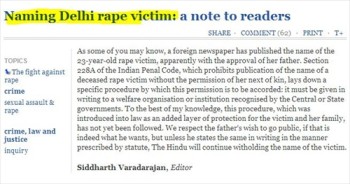
(Credit: the Hindu, screenshot, highlight added)
Even though some news outlets, including The People, have named the New Delhi, India rape victim who died late last month, many Indian news outlets still won’t do so. And the father of the victim denies The People’s claims that he OK’ed the identification of his daughter.
In a Jan. 5 report, The People, a weekly London tabloid, reported that the woman’s father released her name –but not a photo — in hopes that it would give “strength” to other victims. The woman’s father is quoted as saying:
“My daughter didn’t do anything wrong, she died while protecting herself. I am proud of her. Revealing her name will give courage to other women who have survived these attacks. They will find strength from my daughter.”
The People noted in its report the legal restrictions against naming rape victims, writing:
“Indian law prohibits naming a rape victim unless she authorises it or, if she is dead, her family agrees to it. At the moment it is enough for the devastated family to sanction the release to the world of their precious daughter’s name.”
As iMediaEthics previously wrote, the Delhi police said they were charging Indian TV news channel Zee News over its interview with the victim’s male friend, who was the “only witness” to the attack and beaten himself. Zee News was accused of naming the victim but, as we noted, it didn’t appear that Zee News named either the victim or her friend, though it did show her friend’s face. (Also, in The People’s report, the father also denied reports that the friend who was with her when the attack happened was her boyfriend — he was a friend. News site Global Post, for one, reported the male friend was her “fiance,” and The Australian called him her “boyfriend.”)
Regardless of The People’s reporting, The Hindu, for example, published a note from its editor, Siddharth Varadarajan, explaining that it won’t name the victim until it gets confirmation “in writing” from her father. The Hindu wrote in part:
“Section 228A of the Indian Penal Code, which prohibits publication of the name of a deceased rape victim without the permission of her next of kin, lays down a specific procedure by which this permission is to be accorded: it must be given in writing to a welfare organisation or institution recognised by the Central or State governments. To the best of my knowledge, this procedure, which was introduced into law as an added layer of protection for the victim and her family, has not yet been followed. We respect the father’s wish to go public, if that is indeed what he wants, but unless he states the same in writing in the manner prescribed by statute, The Hindu will continue witholding the name of the victim.”
In its own report on the father’s interview, Reuters noted it has “opted not to identify the victim.” iMediaEthics has asked Reuters what went into this decision and will update with any response. Similarly, the Wall Street Journal said it wasn’t going to name her “in accordance with Indian laws about identifying rape victims.” iMediaEthics debated internally about whether to name her in our reporting about the controversy and has decided to suspend naming her for now.
Media outlets’ restraint in publishing her name, even though it is available, may have served them well. The Hindustan Times reported the rape victim’s father didn’t approve the naming of his daughter quite yet. The father is again quoted on this issue, saying:
“I have only said we won’t have any objection if the government uses my daughter’s name for a new law for crime against women that is more stringent and better framed that the existing one.”
iMediaEthics has written to The People asking:
- For response to The Hindu’s report that the father didn’t want his daughter’s name publicized yet
- If The People has a video/tape transcript of the interview to verify/dismiss the father’s claims
- If The People has heard from the father since its report was published?
- Why The People decided to publish the name of both the victim and her friend?
We will update with any response.
Hat Tip: All Voices






